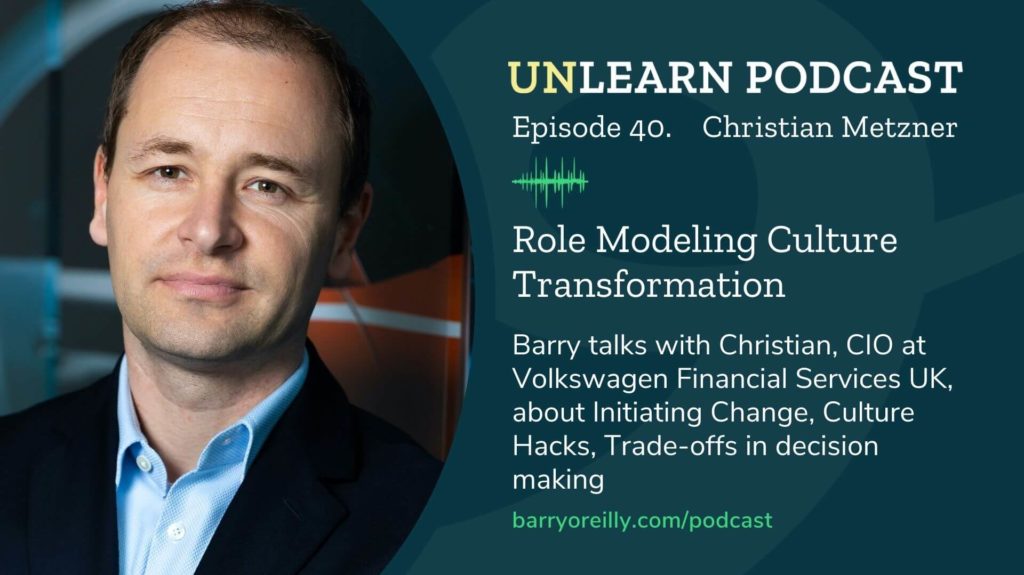This week’s guest is a leader who role models change. Christian Metzner is Chief Information Officer (CIO) at Volkswagen Financial Services UK. Barry O’Reilly describes him as someone who is “constantly staying curious and getting outside his comfort zone; and you only have to spend time with him and his team to realize how much his actions inspire others.” Christian and Barry discuss the role of leadership in inspiring organizational culture. Listen to Role Modeling Culture Transformation with Christian Metzner.
Initiating Change
Christian has learned to step out of his comfort zone and reflect on what other leaders and cultures are doing better. Emphasizing that the one with power needs to initiate the change, he says, “If you are the one in the position with the power, then you need to open up first. You can’t expect others to change if you’re not leading the way.” [Listen from 1:15]
Hacking Culture
Innovation is often the result of challenging yourself and pushing your boundaries. “You don’t come to innovation if you only go one mile faster every day,” Christian points out. “You have to push boundaries… Try to find the 5% to 10% where you can challenge your behaviors, where you can challenge people who might be stuck in their thinking.” He advocates using cultural hacks – low effort steps that can be implemented quickly, but which have high emotional impact – and shares examples of cultural hacks that he successfully implemented. Barry comments that these small changes often create ripple effects throughout an organization. [Listen from 8:40]

Being a Leader
“My simple understanding of leadership is… to remove your blockers and to make you better on a day-to-day basis.” Christian sees learning from competitors and his team as key to creating a culture of innovation: an environment where everyone is on the same playing field. “IT is – next to the capital market – the single biggest threat to an organization like ours,” he points out. “And we need to get our job… absolutely right to enable our commercial colleagues to come up with great products and services for our real end customers.” [Listen from 20:45]
Trade-offs in Decision-Making
Barry commends Christian’s ability to take “a little bit of information and make a decision and then getting more information…” He asks Christian to describe his process and the trade-offs of this approach. Christian responds that transparency, engagement, and iterating in short cycles are the key elements in this approach. The current crisis demands different behaviors, he argues. “We’re not playing the game big fish against small fish anymore,” he says. “We’re playing big fish against fast fish, and that requires a different behavior.” [Listen from 25:40]
Build Systems Around People
“It’s less the individual [than] the systems and the structures that are in place to help them succeed,” Barry comments. “If more companies started to recognize that they’re designing systems around people to make them successful… that’s a massive transformation that… would have a huge impact on their company.” “Let’s bring people into a role where they can flourish, where they are allowed to bring in their strengths,” Christian adds. [Listen from 33:00]
Looking Ahead
Christian says that he wrote a framework in the early days of the COVID crisis that has guided the company’s decision-making. The framework focuses on three dimensions: decisiveness, simple communication, and taking care of one another. He speaks of dealing with the pandemic in phases: they are entering the phase of renewing the company, so they are using what they learned in the previous phases to inform their approach. In particular, he is excited about how the company will maintain pace and flexibility so that they can provide the best possible customer experience. [Listen from 40:05]
Don’t want to miss a post? Sign up for my podcast newsletter and monthly newsletter!















